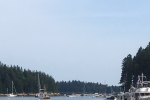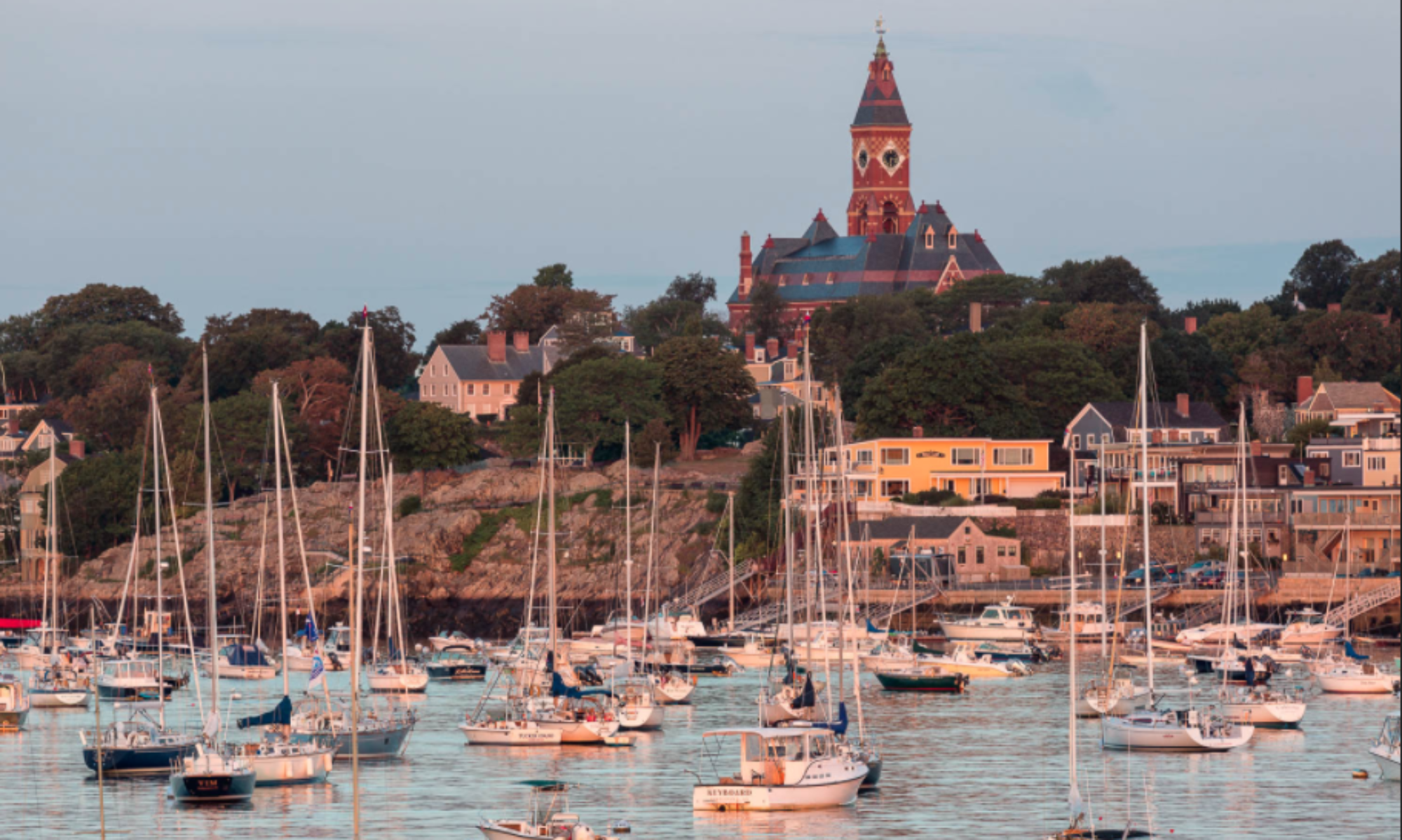We raced from Castine down the Eggemoggin Reach to Burnt Coat Harbor on Swans Island. A couple of years ago, when we were the Race Committee for that year’s Cruise, we started a race from the bottom of the Eggemoggin, outside of Wooden Boat, up to Buck’s Harbor. It was one of the most beautiful races I had ever seen. We were so excited to be actually racing ourselves this time. We motored from Castine down to the starting mark. It was an absolutely incredible day, the sun was warm and the sky was as perfect a blue as you have ever seen. We didn’t win, but it felt like it.
We spent the night at Burnt Coat, a small, beautiful but busy harbor, home to a lobstering coop which meant  lobster boats coming and going and loading and unloading at all hours. While we were having dinner in the cockpit, a schooner arrived, its deck crowded with passengers. A hand tossed an anchor overboard seemingly at our bow and we watched in terror as the nearly 100′ boat came closer and closer and closer to us. The anchor finally caught and the boat swung away from us, settling into position for the night. For the NIGHT?! We were flabbergasted and kind of grossed out at the fact that all of those people on deck would have to go below deck and sleep. And they paid for that privilege! Made our tight quarters seem downright luxurious–at least for that moment.
lobster boats coming and going and loading and unloading at all hours. While we were having dinner in the cockpit, a schooner arrived, its deck crowded with passengers. A hand tossed an anchor overboard seemingly at our bow and we watched in terror as the nearly 100′ boat came closer and closer and closer to us. The anchor finally caught and the boat swung away from us, settling into position for the night. For the NIGHT?! We were flabbergasted and kind of grossed out at the fact that all of those people on deck would have to go below deck and sleep. And they paid for that privilege! Made our tight quarters seem downright luxurious–at least for that moment.
The race from Burnt Coat to Northeast Harbor was my favorite of all. We went boat for boat with the beautiful Concordia yawl Irian, going from the lightest of breeze to a solid 10 kts. At one point we were so close that as I looked over, I saw a friend and former teacher of my son’s on the rail. Hey Charlie! Irian arrived at the finish mark seconds before we did. We yelled compliments across our port bow, and Irian’s crew returned them
 We motored in carefully through the multiple racing circles of a Junior Olympic Sailing event. As we reached the inner harbor, the engine suddenly revved, spontaneously and as it turns out ominously. At the mooring, we found multiple oil and coolant leaks and the skipper decided to bring the boat over to the Hinckley yard in Southwest Harbor first thing in the morning. That evening, it was Tuesday now, was my first low point. I was tired and cranky and sick of being on someone else’s boat–a boat that now might not even get me home. I was invited to spend the next day motoring towards Canada with friends, rather than waiting with Justin and the skipper for Hinckley to diagnose and hopefully fix the problems. I gratefully accepted.
We motored in carefully through the multiple racing circles of a Junior Olympic Sailing event. As we reached the inner harbor, the engine suddenly revved, spontaneously and as it turns out ominously. At the mooring, we found multiple oil and coolant leaks and the skipper decided to bring the boat over to the Hinckley yard in Southwest Harbor first thing in the morning. That evening, it was Tuesday now, was my first low point. I was tired and cranky and sick of being on someone else’s boat–a boat that now might not even get me home. I was invited to spend the next day motoring towards Canada with friends, rather than waiting with Justin and the skipper for Hinckley to diagnose and hopefully fix the problems. I gratefully accepted.
Did you know that a fjord can be demoted? It’s true. After failing to reach Canada and losing interest in the effort, we picked up Justin and the skipper in Southwest for a trip up Somes Sound. Many people described Somes Sound to us as a fjord, the only one of its kind on the East Coast, yet when I looked it up, here is what I found: “In recent years, this description has been somewhat downgraded to the “fjard” because it lacks the extreme vertical topography and the oxygen deprived sediments as the Norwegian fjords.” Welcome to Somes Sound, the Pluto of fjords.
Something else I learned. People on Mount Desert Island pronounce it “dessert,” apparently because the word is French in origin, named by Samuel de Champlain iafter his ship ran aground here in 1604. I have always known it as Mount Desert Island, like the Sahara, but even the guy on the VHF radio weather service pronounced it “dessert.” Champlain himself apparently meant desert, because the tops of the mountains were so barren and bare. In 1886, William Berry Lapham wrote in his book Bar Harbor and Mount Desert Island, “It would hardly seem necessary after quoting Champlain’s statement with regard to the name of this Island and his reasons for so naming it, to call attention to the proper accentuation of the word “Desert,” but there are still many who place the accent on the last syllable, a practice which has a tendency to obscure its meaning.”
Lapham concluded “The fact that many of the natives of the Island accent the word differently and give a different significance to the terms employed by Champlain, proves nothing. We have Champlain’s own statement that the name was intended to describe an island filled with solitary, uninhabited mountain wastes, and no words better described such a place than those used by him.”
It didn’t take. Mount Dessert it remains.
In the final installment, I get to that cocktail recipe, tell you why I hate lobster pots, learn some very hard lessons, and make the best decision yet–to get off the boat.


Really interesting!!!